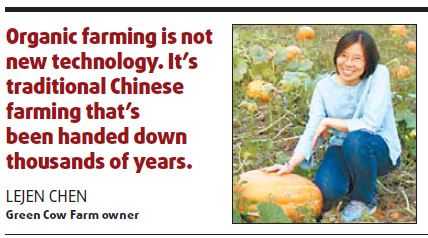
|
Metro> Expats
 |
|
An organic way of life
By Wang Linyan (China Daily)
Updated: 2009-11-04 09:16
To many, a bagel may be just a doughnut-like bread roll for breakfast. But to Chinese American Lejen Chen, it is something that changed her life. Chen, 48, a New Yorker born in Taiwan, has loved bagels since childhood. She began collecting recipes on them while studying at a high school in Manhattan and started to bake the breads at university. In 1989, Chen came to Beijing to work as a guide for Americans attending a kite festival in Weifang, Shandong province. She decided to stay because she found the country "exciting and stimulating". Seven years later, while working as a freelance producer on a film about an artist in Guilin of the Guangxi Zhuang autonomous region, Chen found out that a hotel was selling "bagels" that were actually hamburger rolls holed out by a cookie cutter. "I couldn't believe it," said Chen. "Bagels and hamburger rolls are so different, like rice and noodles. So I thought, 'One day, I'm going to fix this'." But Chen did not really pay serious attention to bagels until she shared it with her Chinese friend, Shan En, who is now her husband. He encouraged her to open a shop. Inspired, Chen started to make bagels in the kitchen of a photojournalist friend. She was soon making under 100 bagels a week and delivering them to a shop of the US embassy. Subsequently she set up a bagel factory in a warehouse in Jiuxianqiao. Now she makes about 400 bagels a day, apart from other breads. When orders surge, she churns out up to 2,000 items a day. The bagels go to about 15 four- and five-star hotels including the Ritz-Carlton, Marriot and China World, as well as supermarkets.
"We needed safe, clean lettuce to make salads. It's dangerous to use salad greens that have chemical pesticides. So we had to grow our own to guarantee safety and quality," Chen said. They started their own organic farm, Green Cow, in 2004 in a village in Shunyi to feed her family and service her restaurant. The farm has since expanded to cover 6 hectares and grows about 30 types of vegetables. There are four greenhouses and Chen raises cows, pigs, chickens and bees. When animals get sick, she also prefers to treat them with traditional Chinese medicines. Still, Chen remembers her farm manager's immediate reaction to organic farming. "He said it would not grow well," she recalled. "But I think we have won them over. They see that it is possible to farm without the chemicals if you bring back soil fertility and health." But it took her three years to make the soil fertile. There's no profit for organic farms in the first three to four years, she said. "Five years ago, organic products were very limited. I am almost a vegetarian and I felt very guilty feeding my family foods that I wasn't comfortable with," she said. "It is a way of life now. I still use the supermarket to buy organic pork, tofu and limited fruits. But my cart is always pretty empty when I shop." Her Community Supported Agriculture (CSA) is also a vegetable club that has expanded to its current 20 members made up of foreign and Chinese families. They pay 16,000 yuan a year for a weekly supply of fresh seasonal vegetables. Members cannot order and they can only get what the farm grows. "There's nothing more important than organic farming for me. Organic farming is not new technology. It's traditional Chinese farming that's been handed down thousands of years," she said.
 |
||||||||